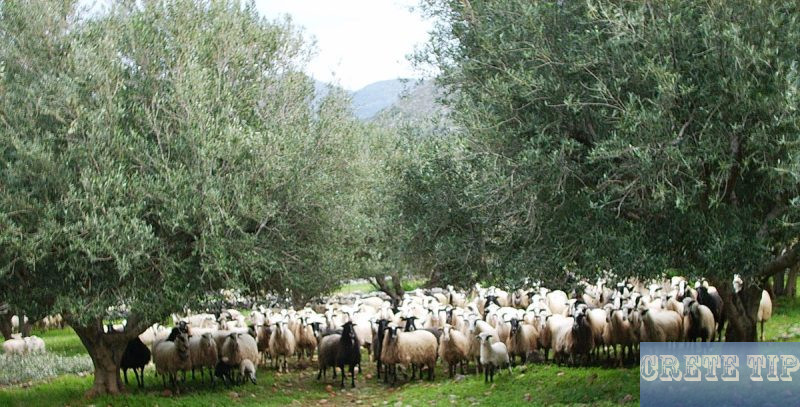Incidentally, in Crete, “frappes” is the name given to local barons who stand out due to their good connections, political influence or favours, the dubious origins of their wealth, their fancy cars and their macho behaviour.
The OPEKEPE Scandal
The scandal surrounding OPEKEPE is everywhere in Greece right now. Every day, there’s some new twist—more corruption, more illegal subsidies, more political drama.
It’s not just a political mess; it’s a social one too. Subsidies meant for agriculture got misused, with a handful of people pocketing EU aid while the rest of the community lost out.
These illegal payments hit the economy hard and make Greece look bad on the international stage. It’s frustrating to watch public money just vanish into the hands of a few.
Political repercussions have already begun. Big names are gone—like the former Minister of Rural Development, Makis Voridis—who stepped down as this controversy grew.
The fallout’s not just about resignations. People are openly doubting whether the government can handle the deep-rooted problems it keeps promising to fix.
Despite all the big talk about tackling corruption, the same old problems just won’t go away. Some folks say things have even gotten worse under years of centre-right rule.
Key Areas Impacted by the Scandal
Area |
Description |
|---|---|
Corruption |
Widespread mismanagement of subsidy funds, with illegal payments benefiting select groups. |
Political Fallout |
Resignations, heated parliamentary debates, and growing distrust of governmental promises. |
Social Effects |
Communities feel betrayed as funds meant to help local farmers and businesses were misused. |
Economic Impact |
Heavy fines by the EU—above €400 million—will be covered by the national budget, affecting all citizens. |
The social impact is impossible to ignore. The misuse of subsidies isn’t just about numbers on a spreadsheet—it hits rural areas and local communities, especially in places like Crete, where political favouritism and clientelist networks have always been a thing.
People are tired of seeing the same influential families and politicians treat public funds like their own piggy bank. It’s like these folks have carved out little empires, keeping the benefits for themselves and leaving everyone else behind.
The official story about fighting the “deep state” just doesn’t ring true anymore. No one’s really tackled the tangled web of political interests and government operations.
Unfortunately, for people who have lived in Crete for a long time, none of this comes as a real surprise, and none of the characters in this tragicomedy appear out of nowhere. The “Frappes” have been living among us for years with style, magic and the mentality that this place belongs to them.
And they are right. Crete belongs to them. For four or five decades, it was transformed into their Vilayet, with subsidies as a battering ram.
Two or three generations of Cretans ‘burned’ in the ‘fire’ of quick and easy enrichment. A fire that fuelled and continues to fuel the ugliest side of the island.
When you learn about cunning and laziness and see how an entire political system caresses you and does you favours, virtually worships you, then you also learn about false clan leaders, godfathers and local mafiosi, about ‘bandits’ and drunk driving, about slaps and punches, about illegal weapons and drugs.
You learn about impunity and thus about not having to hide.
On the contrary, the right thing to do is to walk around proudly, with your expensive Jeep with tinted windows parked illegally in the village square, with your black shirt open and a pistol in your belt, with a crooked smile of pride under your thick moustache and a look that is ready to grab anyone who makes the mistake of looking at you askance.
Consequences and Outlook
- Financial Penalty: The EU fine is massive—over €400 million—and it’s going to land squarely on taxpayers’ shoulders.
- Political Instability: Tempers are flaring between the government and opposition, and more resignations or shakeups could be coming.
- Public Trust: People’s faith in state institutions is at an all-time low after so many failures to stop this kind of thing.
- Reform Challenges: Real reform sounds nice, but old habits and resistance inside the system aren’t going anywhere fast.
Leading Local Officials in Crete and Livestock Union Leaders Caught Up in OPEKEPE Case
The OPEKEPE subsidy scandal keeps growing. Investigators have uncovered the involvement of senior local government officials in Crete and key livestock union leaders.
Turns out, this network stretched way beyond Athens. At least six top local authorities in Crete—from the Regional Government, deputy mayors, and heads of opposition parties—show up in the files.
Even areas that tourists know best have deep connections to farming and livestock, so political influence and economic interests go hand in hand. The recorded conversations are pretty damning.
Local officials didn’t just stand by—they actively asked for or demanded favours from OPEKEPE and the Ministry of Rural Development. They wanted payments and approvals, sometimes for themselves, sometimes for others.
This wasn’t a one-off. It’s a pattern—systematic corruption, with local power players deeply involved.
Some administrators used their positions to issue false certificates about livestock or grazing land. Those forged documents triggered illegal subsidy payments, feeding the wider network.
Sometimes, the fake data unlocked funds that never should’ve been paid. Two of Crete’s largest municipalities seem especially exposed as the investigation digs deeper.
Key points in the case include:
Involved Parties |
Role in the Scandal |
|---|---|
Regional Government Officials |
Coordinated with OPEKEPE for favoured subsidy approvals |
Deputy Mayors |
Actively requested special treatment for beneficiaries |
Opposition Leaders in Heraklion |
Engaged in influence to secure payments or documents |
Livestock Union Representatives |
Facilitated or enabled false declarations for subsidies |
This whole mess needed more than just a few bigwigs in Athens. Local officials and union leaders played a central role in keeping the machine running.
It’s a two-way street. The folks at the top couldn’t pull this off alone—they needed local partners to bend the rules and keep the system going.
It’s honestly worrying to see elected officials so tangled up in this. Agricultural support mechanisms were supposed to help rural economies, not prop up corrupt networks.
Efforts to Explain the Reported 7.8 Million Sheep and Goats in Crete

Authorities are still scrambling to explain the 7.8 million sheep and goats supposedly living on Crete. That number just doesn’t add up, and everyone knows it.
The whole thing reeks of false declarations and political games. Even with mounting pressure, those involved seem more interested in quietly shrinking the numbers on paper than actually fixing the root problems.
Now, European media and EU officials are paying attention. The Ministry of Agricultural Development faces tough questions in Brussels, and future funding could be on the line.
It’s a mess, honestly. They have to justify these numbers, but nobody’s buying it.
Legal and Regulatory Challenges
EU rules only allow a 10% reduction in livestock numbers per year. That means you can’t just slash the fake numbers overnight without raising flags.
So, the official count—over 7.8 million—can’t be quickly fixed without triggering another wave of investigations. Proposals to just stop activating subsidies for the extra animals have been tossed around, but they’re not really workable.
If they tried that, it’d just create new compliance headaches. Plus, the inflated numbers are already locked into veterinary records, so European monitors would notice any tricks right away.
Political and Social Implications
The scandal’s now a full-blown political crisis. Opposition parties are hammering the government, and the whole affair exposes major weaknesses in how Greece tracks livestock and prevents fraud.
Honestly, the efforts to “clean up” the numbers look more like damage control than real reform. The fact that these inflated figures are still around suggests the same old collusion between officials and political interests.
It’s tough to trust the subsidy system, especially in Crete, where sheep and goat farming is a way of life. People are losing confidence, and who could blame them?
Summary Table of Key Issues
Issue |
Details |
|---|---|
Reported Livestock Number |
7,812,923 sheep and goats declared in Crete for 2024 |
EU Regulation Limit |
Maximum 10% annual reduction allowed in livestock figures |
Impact on Subsidies |
Risk of sanctions and loss of future subsidies if false numbers persist |
Data Verification |
Veterinary records confirm inflated figures, complicating corrections |
Political Fallout |
Heated criticism from opposition; concern over government and political collusion |
Proposed Solutions |
Attempts to reduce numbers in reports; blocking subsidy activation not viable |
Trying to fix this mess with the livestock data shows just how hard it is to regain trust once misreporting becomes the norm. Getting back to honest, transparent data handling is the only way forward, but it won’t be easy—especially with so much at stake for Crete and Greece’s standing in the EU.
Illegal Beneficiaries of OPEKEPE Funds – Will the Money Ever Be Reclaimed?
Several parties took advantage of subsidies from OPEKEPE without having the right to do so.
These illegal gains mostly involved people and organizations who grabbed support meant for farms or livestock under false pretenses.
Investigators found that many of these cases started with fake or doctored applications.
The government says it wants to get to the bottom of this mess.
A special financial control team is on the way.
This crew will work with financial police and tax authorities to dig through every suspicious subsidy payment.
They’ll start with the livestock sector, since that’s where a lot of the weird payments showed up.
If they find an unlawful subsidy, they’ll just take that amount out of any future subsidy the person tries to claim.
That’s actually allowed under current rules—kind of a payback system for past mischief.
Action Step |
Description |
|---|---|
Establish control team |
Includes financial police and tax authority cooperation |
Focus on livestock subsidies |
Initial crackdown will centre on this sector |
Deduct illegal funds |
Subtract unlawful payments from future subsidy claims |
Legal action |
Courts intervene when recipients no longer qualify for subsidies |
If someone’s tax ID is inactive or they’re no longer eligible, the case heads to court.
The goal there is pretty straightforward: get the money back, one way or another.
Recently, prosecutors suggested guilt for seven people who managed or benefited from these illegal grants.
That seems to show the government isn’t just talking tough—they’re actually moving forward, at least on paper.
New legislative measures will roll out soon to shake up the system.
These changes will focus on transparency, better payment processes, and even digital tools to block fraudsters.
Expect more frequent checks—both physical and digital—to catch problems early.
The reforms should also get OPEKEPE and tax authorities working together more closely.
Maybe then, it’ll be a lot tougher for anyone to slip through the cracks.






